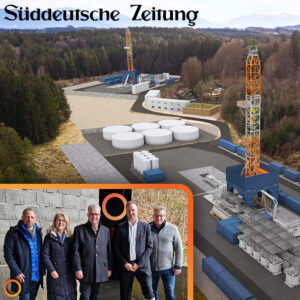German news publication Süddeutsche Zeitung covered a recent tour of Eavor’s first commercial-scale closed-loop geothermal plant in Geretsried, Germany.
The article, written by local journalist Susanne Hauck, reported the details of Bavaria’s Minister of the Environment Thorsten Glauber and chairman of the Free Voters parliamentary group Florian Streibl’s visit to the project site in early February.
Hauck begins her coverage by painting a morose picture of the area, describing the two previously unsuccessful attempts to harness the subterranean heat and how their failure seemed to dampen any hope of geothermal success.
But the tone of the article soon changes, with confident quotes from Eavor Germany’s managing director, Daniel Molk. “The whole world is looking at Geretsried at the moment,” he said. “This is not science fiction.”
The visiting politicians were shown around the construction site by Molk, who explained the key differences between the traditional geothermal extraction techniques initially explored in the area, and Eavor’s innovative closed-loop technology.
As noted in Hauck’s article, traditional geothermal techniques rely on large underground pools of water, otherwise known as aquifers. Exploratory drilling for aquifers is costly and doesn’t promise results – a concept the citizens of Geretsried are well-acquainted with. But the proprietary Eavor-Loop™ bypasses these risks, and instead pulls heat directly from the subterranean rock.
Minister Thorsten Glauber was quoted in an Eavor press release, saying “the innovative Eavor-Loop™ is a promising technology for extracting geothermal heat even from deep rock with no aquifer. In Geretsried, the Eavor-Loop™ is now to be used for the first time for geothermal power generation and municipal heat supply.”
“I wish the project every success,” added Minister Glauber.
Hauck reported the plant will be up and running by the fall of 2024, but notes the need for significant infrastructure investments in order to fund a new shared district heating network to allow for the local distribution of the extracted heat.



















